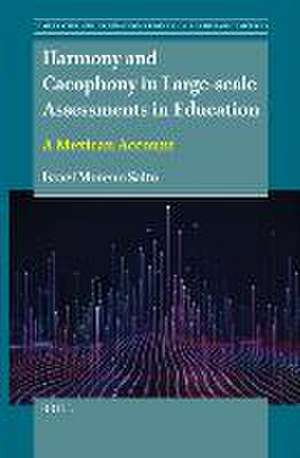Harmony and Cacophony in Large-scale Assessments in Education: A Mexican Account: Comparative and International Education: The Hispanic Americas, cartea 1
Autor Israel Moreno Saltoen Limba Engleză Paperback – 25 iul 2023
Preț: 283.07 lei
Nou
Puncte Express: 425
Preț estimativ în valută:
54.21€ • 55.86$ • 45.41£
54.21€ • 55.86$ • 45.41£
Carte indisponibilă temporar
Doresc să fiu notificat când acest titlu va fi disponibil:
Se trimite...
Preluare comenzi: 021 569.72.76
Specificații
ISBN-13: 9789004682825
ISBN-10: 9004682821
Pagini: 215
Dimensiuni: 155 x 235 mm
Greutate: 0 kg
Editura: Brill
Colecția Brill
Seria Comparative and International Education: The Hispanic Americas
ISBN-10: 9004682821
Pagini: 215
Dimensiuni: 155 x 235 mm
Greutate: 0 kg
Editura: Brill
Colecția Brill
Seria Comparative and International Education: The Hispanic Americas
Notă biografică
Israel Moreno Salto, Ph.D. (2020), University of Cambridge, is Professor of Education Sciences at the Universidad Autónoma de Baja California. Israel has published journal articles and book chapters on comparative education, education governance and large-scale assessments in Mexico.
Cuprins
Foreword: Choreographing the Governing of Education
Susan L. Robertson
List of Figures and Tables
1 Introduction: Problematizing Large-scale Assessment Programs
1 Locating the Problem
2 Large-scale Assessment Arrangements in a Global Context
3 Large-scale Assessment and Governance Literatures
4 Purpose of the Research
5 Theoretical and Methodological Approach
6 Layout of the Book
2 The Rise and Development of Large-scale Assessments as Tools for Governing
1 Understanding Large-scale Assessments
2 Large-scale Assessments Today, a Complex and Neglected Concept
3 Efforts to Improve Education Systems
2 Governing the Education Sector
3 Conclusions
3 Expanding Our Understandings of Large-scale Assessments and Governance
1 Large-scale Assessments and Governance
2 Thinking and Pedagogical Tools
3 Conclusions
4 Mexico’s Cacophony or Harmony of Large-scale Assessments?
1 Large-scale Assessment Programs in Mexico
2 PISA
3 ERCE-LLECE
4 PLANEA and Predecessors
5 LSA s and Claims to Aiding Policy Decisions and Education Practices
6 Conclusions
5 Local Scale: Teachers
1 Sources of Data for Unit One
2 Context of the Local Unit of Analysis
3 Large-scale Assessments in the Subnational State
4 Large-scale Assessment Data for Aiding Practice Improvement
5 What Do Educators Know about Large-scale Assessments?
6 Program Knowledge, Depth and Acquaintance
7 Offering Data to Which Educators?
8 PISA and PLANEA Publications
9 Perceived Usefulness of Large-scale Assessment Data
10 Unintended Large-scale Assessment Data Effects at the Local Scale
11 Relevance of Large-scale Assessment Programs, What about the Bigger Picture?
12 Conclusions
6 Subnational Scale: Municipal and State Policymakers
1 Sources of Data for the Subnational Case
2 EXCALE Large-scale Assessment
3 Context of Preschool Education
4 The EXCALE’s Use in Kindergarten Initiative
5 Use of Results?
6 Math and Literacy: A Myth?
7 Conclusions
7 National Scale: Legislators and Secretariat Officials
1 Policy I: The General Law for the Professional Teaching Service
2 Policy II: Key Learnings for an Integral Education
3 Conclusions
8 Governing Tools: How Large-scale Assessments Shape Visions?
1 Scales, Bits and Tools
2 Shaping Vertical Vision
3 Governing Tools and the ERCE-LLECE Case
4 Conclusions
9 Conclusions
1 Main Research Concluding Thoughts
2 Contributions of This Study
3 The Large-Scale Assessment Landscape in Mexico Since the Study
4 Future Research
References
Index
Susan L. Robertson
List of Figures and Tables
PART 1: The Large-scale Assessment Assemblage
1 Introduction: Problematizing Large-scale Assessment Programs
1 Locating the Problem
2 Large-scale Assessment Arrangements in a Global Context
3 Large-scale Assessment and Governance Literatures
4 Purpose of the Research
5 Theoretical and Methodological Approach
6 Layout of the Book
2 The Rise and Development of Large-scale Assessments as Tools for Governing
1 Understanding Large-scale Assessments
2 Large-scale Assessments Today, a Complex and Neglected Concept
3 Efforts to Improve Education Systems
2 Governing the Education Sector
3 Conclusions
3 Expanding Our Understandings of Large-scale Assessments and Governance
1 Large-scale Assessments and Governance
2 Thinking and Pedagogical Tools
3 Conclusions
4 Mexico’s Cacophony or Harmony of Large-scale Assessments?
1 Large-scale Assessment Programs in Mexico
2 PISA
3 ERCE-LLECE
4 PLANEA and Predecessors
5 LSA s and Claims to Aiding Policy Decisions and Education Practices
6 Conclusions
PART 2: Large-scale Assessments at the Local, Subnational and National
5 Local Scale: Teachers
1 Sources of Data for Unit One
2 Context of the Local Unit of Analysis
3 Large-scale Assessments in the Subnational State
4 Large-scale Assessment Data for Aiding Practice Improvement
5 What Do Educators Know about Large-scale Assessments?
6 Program Knowledge, Depth and Acquaintance
7 Offering Data to Which Educators?
8 PISA and PLANEA Publications
9 Perceived Usefulness of Large-scale Assessment Data
10 Unintended Large-scale Assessment Data Effects at the Local Scale
11 Relevance of Large-scale Assessment Programs, What about the Bigger Picture?
12 Conclusions
6 Subnational Scale: Municipal and State Policymakers
1 Sources of Data for the Subnational Case
2 EXCALE Large-scale Assessment
3 Context of Preschool Education
4 The EXCALE’s Use in Kindergarten Initiative
5 Use of Results?
6 Math and Literacy: A Myth?
7 Conclusions
7 National Scale: Legislators and Secretariat Officials
1 Policy I: The General Law for the Professional Teaching Service
2 Policy II: Key Learnings for an Integral Education
3 Conclusions
PART 3: Expanding Our Understandings of Large-scale Assessments
8 Governing Tools: How Large-scale Assessments Shape Visions?
1 Scales, Bits and Tools
2 Shaping Vertical Vision
3 Governing Tools and the ERCE-LLECE Case
4 Conclusions
9 Conclusions
1 Main Research Concluding Thoughts
2 Contributions of This Study
3 The Large-Scale Assessment Landscape in Mexico Since the Study
4 Future Research
References
Index
